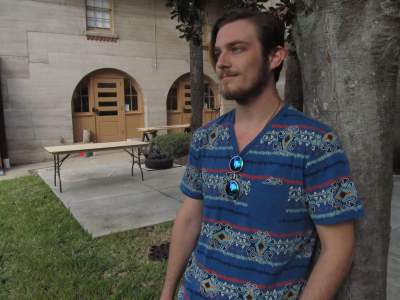 By Caroline Cover | gargoyle@flagler.edu
By Caroline Cover | gargoyle@flagler.edu
Photo by Laurie Avocado
This November, Florida residents will have the opportunity to vote on legalizing medical marijuana.
Those suffering from painful diseases such as cancer, glaucoma, HIV/AIDS, Hepatitis C, Crohn’s disease, Parkinson’s disease, multiple sclerosis, or other medical conditions would be among the Florida residents who would qualify for a medical marijuana card in effort to deal with pain.
For some, the legalization of medical marijuana in Florida could be life changing, and current polls are showing an overwhelming public support on this proposal.
According to a study by Quinnipiac University, 82 percent of Florida residents favor the use of medical marijuana.
Although many Florida residents are showing undeniable support for medical marijuana in our state, St. Augustine’s deputy sheriff Jon Johnson believes that the proposal has left a bit of room for improvement.
“I believe marijuana does have medicinal properties,” Johnson said. “However, this law has the potential for misuse. In other states you can find numerous examples of this industry being unregulated. Many so called ‘medicinal users’ are in actuality using for recreational purposes.”
In my opinion, the possibility of potential misuse of marijuana is far surpassed by the importance of the outstanding number of people this type of medicine would help.
Shannon Murray, a 21-year-old student, has aggressive fibromatosis, a cancerous disease more commonly known as a desmoid tumor. The pain from her condition, she says, is unbearable. Murray, like many other cancer patients, would benefit from medical marijuana in her state.
“There is no end to this,” Murray said. “This is my life. This is the path God has chosen for me and I accept that. But I don’t want this tumor to control me. I won’t let it.”
Eating healthy and smoking marijuana are the two things that Murray claims help with her chronic pain.
“Everything has changed since I found out about my cancer. I can’t work out and stay in shape like I used too. It causes me unbearable pain,” Murray said. “Marijuana is one of the only things that helps take away the pain.”
Though medical marijuana may be a controversial topic for many individuals, it is my belief that only good can come from this proposal.
But if the law were to pass in November, it would be a potential gateway for the eventual legalization of marijuana altogether in Florida, as well as the cause of many regulatory questions, explains deputy sheriff Johnson.
“I’ve never responded to a call where marijuana was involved and the individuals were making sound decisions,” Johnson said. “Should it be legal? Yes. But the real question is how do you take the criminal element out of the equation. What about the ‘mom & pop’ grower, or the individual growing in his house? How do we regulate and prosecute these cases?”
Although not all of these questions can be answered quite yet, the future of medical marijuana in the sunshine state is looking bright.




Be the first to comment on "The future of medical marijuana"